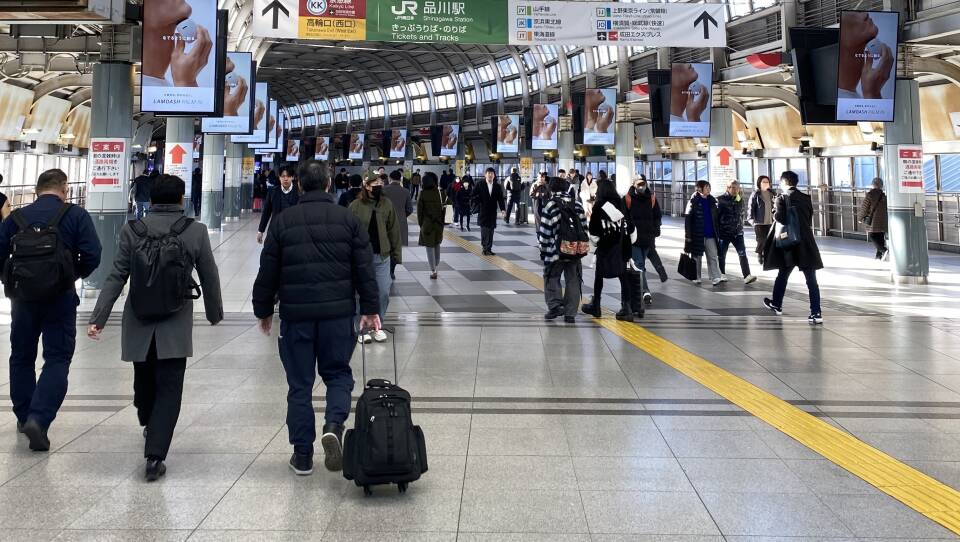This is a web edition of GBH Daily, a weekday newsletter bringing you local stories you can trust so you can stay informed without feeling overwhelmed.
❄️ Slight chance of snow showers this morning, so you have an excuse to play some Prince . Otherwise cloudy and windy with highs in the 40s and sunset at 7:18 p.m.
Our GBH News colleague Jeremy Siegel went on a dream assignment: exploring transportation in Tokyo. He came back with, well, a busload of stories, including pieces about how Japan keeps its trains safe from earthquakes , a look into how the country’s privately run train companies work and a profile of an Australian expat who became the voice of Japan’s most famous train . Today he’s bringing us a story with more local ramifications. How did Tokyo become a city with less reliance on cars? And what can Boston learn from them?
Four Things to Know
Eyes on the State House in 2026: Mike Kennealy, a former private equity manager who served as Gov. Charlie Baker’s housing and economic development secretary, announced that he’s running for governor in the 2026 election . He will be running as a Republican challenger to current Gov. Maura Healey, who has already announced her re-election bid. “The political class on Beacon Hill is more concerned with their future than with ours. Our beacon on a hill has become a beacon in the rearview mirror,” Kennealy said. “The people of Massachusetts expect and deserve better.”
Student visas revoked: Federal officials revoked the immigration visas of 17 current and former students at Harvard, UMass Boston and UMass Amherst. Officials at all three universities said immigration officials did not contact them — instead, they found out by checking an Immigration and Customs Enforcement database themselves. University officials said the revocations do not appear to be connected to any pro-Palestinian activism. “International students are just a very vulnerable and very easy-to-reach population for the goals of meeting quotas of deportations,” said Gerardo Blanco, academic director of Boston College’s Center for International Higher Education. “The Trump administration wants record-breaking numbers of deportations that they’re not getting. In many ways, those are difficult to get through raids or other strategies.”
Tax collections up: In the first three months of 2025, Massachusetts collected $786 million more in taxes than the Department of Revenue had anticipated. Where did this money come from? The capital gains tax and the so-called millionaires’ tax on income over $1 million. Still, Revenue Commissioner Geoffrey Snyder said revenue from the sales tax was about flat, which “probably reflect[s] the impact of declining consumer confidence, and the lingering impact of past inflation.”
RIP, Willard the steer: Allandale Farm in Chestnut Hill held a funeral for Willard, a Scottish Highland steer that had lived on their property for 17 years. Willard leaves his fellow Scottish Highland pal Curtis and many adoring fans. “We’ve always known how much both these guys mean to the community,” said Helen Glotzer, the farm’s general manager. “But it has been on full display in ways that we didn’t even really understand the depth of until now. It’s been really moving.” Glotzer described Willard’s cause of death as “old bones:” he weighed more than 1,000 pounds and could no longer manage standing up. “He went on his own,” Glotzer said. “We like to think, and it’s quite likely, that he went quite peacefully.”
Lessons from Tokyo: the world’s largest city is car free
By Jeremy Siegel
When I first stepped foot on a train in Tokyo, I felt like I had entered another world. And it wasn’t just that I was on the other side of the globe: it was the glaring differences I noticed between the city and Boston.
Tokyo is served by what’s often considered the best transit system in the world. Dozens of train lines carry some 40 million passengers to more than 800 different stations every day. Virtually nobody uses a car. Traffic feels non-existent. Pollution levels are low.
On top of that, Tokyo is remarkably affordable — and livable. A couple earning the city’s minimum wage can comfortably afford the average monthly rent of a one-bedroom apartment. That’s a pipe dream here in Eastern Mass.
So how did Tokyo do it?
From on-the-ground reporting in the world’s biggest city and months of conversations with experts abroad and locally, I found that Tokyo and Boston offer a split-screen tale of two cities. Boston is facing an affordability crisis, our public transportation system is staring down major operational and financial challenges, and state leaders are scrambling to figure out ways to meet our ambitious emissions goals.
Tokyo, with its sprawling transportation system and dense, affordable housing, offers solutions. By investing in projects that treat housing and transportation as two sides of the same coin, and by instituting policies that discourage the use of cars and encourage the use of transport, Tokyo — with a population of 37 million — runs seamlessly, efficiently and cleanly.
Over the next two days on GBH 89.7 and on our website, I’ll be sharing insights from my recent assignment in Tokyo, reporting stories for our global news program The World. I hope they get you thinking about how Greater Boston’s mammoth challenges could be surmountable with some radical new ideas.
Read on for an inside look at how Tokyo became a car-free city — and how Boston missed the boat more than half a century ago. And stay tuned tomorrow for an in-depth look at how Tokyo provides a blueprint for affordable, transit-oriented development.
If you enjoy my reporting for GBH News,
please check out some of the stories I recently reported from my trip to Japan for The World.






